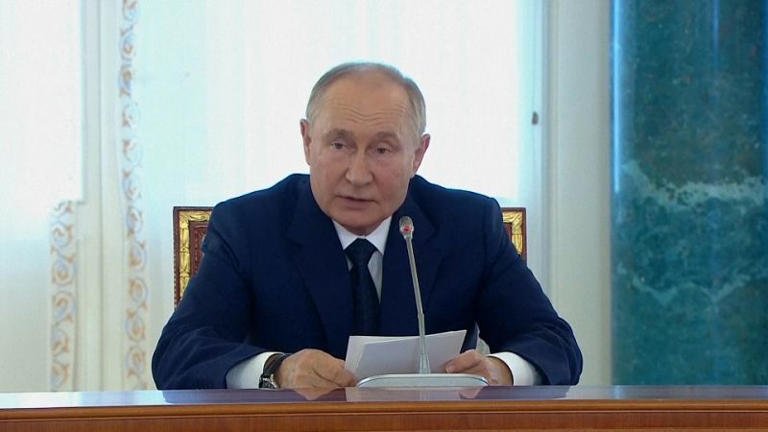Saint Petersburg, RUSSIA — Russian President Vladimir Putin hosted a high-level meeting with representatives of BRICS countries on Thursday, as the group embarks on its 2024 rotating presidency under Russia’s leadership.
The meeting, held at the Konstantinovsky Palace in Saint Petersburg, was a prelude to a two-day security summit focused on the evolving world order and the BRICS alliance’s future trajectory.
Putin highlighted a significant development in the organization’s expansion strategy.
“We cannot ignore the increasing interest in BRICS from many countries,” he declared. “Today, more than thirty countries—specifically 34—have expressed a desire to join our union in one form or another.
Therefore, an active discussion has been initiated among all BRICS participants regarding the modalities for a new category of partner states.”

This announcement marks a pivotal moment for BRICS, which aims to establish a multipolar world order. The group, originally comprised of Brazil, Russia, India, and China, with South Africa joining in 2010, has recently expanded to include Iran, Egypt, Ethiopia, and the United Arab Emirates. The alliance’s expansion underscores its growing influence on the global stage.
China’s Foreign Minister Wang Yi addressed the gathering on Wednesday, emphasizing the need for unity within BRICS amidst external criticism. “We need to take into account each other’s core interests and major concerns, safeguard our respective sovereignty, security, and development interests,” Wang stated. His remarks came in response to critiques from some nations who question the BRICS alliance’s objectives and policies.
The security summit, which precedes the BRICS summit in Kazan next month, is an opportunity for the organization to discuss key security issues and align strategies for future cooperation. Both Russian President Vladimir Putin and Chinese President Xi Jinping are expected to attend the upcoming summit, underscoring the significance of their collaborative efforts.
Tensions between BRICS and Western nations were evident in recent statements from Iran. Ali Akbar Ahmadian, Secretary of Iran’s National Security Council, accused the United States of expanding terrorism and violating international sovereignty. His comments came in response to recent U.S. allegations that Iran had supplied ballistic missiles to Russia for use against Ukraine. The U.S. has imposed new sanctions on both Moscow and Tehran, a move that has been sharply criticized by Iran’s foreign ministry, which denies the accusations.
The BRICS alliance’s recent expansion efforts include consideration from Saudi Arabia, which has indicated interest in joining, and formal applications from Azerbaijan and Malaysia. As the organization navigates these geopolitical complexities, its aim remains to foster a fairer and more balanced global order by challenging existing international institutions such as the United Nations, the International Monetary Fund, and the World Bank.
With its growing membership and strategic initiatives, BRICS continues to shape the discourse on global governance and international security, positioning itself as a significant player in the evolving world order.